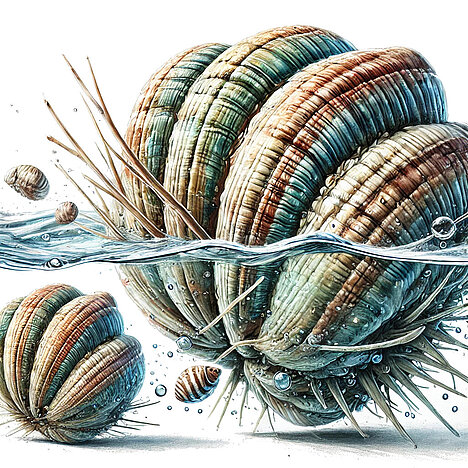Barnacle shells

In the infinite expanse of nature, we often find the most surprising things that can affect the well-being of our pets. Among these hidden treasures and potential dangers, barnacle shells, the remains of small but fascinating sea creatures, deserve special attention. These shells, often overlooked and considered mere beach finds, hold both potential benefits and risks for our four-legged friends. In this article, we delve deep into the world of barnacle shells to uncover their secrets and find out whether they are an unusual superfood or a hidden source of danger for dogs.
What are barnacle shells?
Barnacles belong to the barnacle family and live attached to rocks, ship hulls and even marine animals. After their natural life cycle, they leave behind hard, calcareous shells that can wash up on the beach. These shells consist mainly of calcium carbonate, a mineral that is important in many aspects of nutrition and health.
Potential benefits of barnacle shells for dogs
Natural source of calcium
Calcium is an essential mineral for dogs, important for the development and maintenance of strong bones and teeth. Barnacle shells could theoretically serve as a natural source of calcium, especially when ground into a fine powder that can be added to dog food.
Supporting dental health
Chewing on hard materials can contribute to dogs' dental health by helping to reduce tartar and massaging the gums. Finely ground barnacle shells could provide an additional abrasive component in the food in small amounts to serve this purpose.
Risks and disadvantages: Caution advised
Risk of ingestion and injury
Unprocessed barnacle shells pose a significant risk to dogs due to their hard and sharp-edged nature. Ingestion can lead to internal injuries, blockages and other serious health problems.
Toxic contamination
Barnacle shells that come from the sea can accumulate contaminants such as heavy metals or toxic compounds that are harmful to dogs. Exposure to these contaminants, even in small amounts, can lead to health risks.
Uncertain nutrient availability
While calcium is an important nutrient, the bioavailability of calcium from barnacle shells to dogs is uncertain. Absorption and utilization of the mineral may be inefficient, diminishing the potential benefits.
A double-edged sword
Barnacle shells, the remains of small sea creatures, hold both fascination and risk. While the theory of a natural source of calcium seems attractive, the potential dangers and disadvantages clearly outweigh the benefits. The risks of internal injury, toxic contamination and uncertain nutrient availability make barnacle shells a less-than-recommendable choice for a dog's diet or chew toy. It is important that dog owners always keep the health and safety of their loyal companions in mind and opt for proven, safe and nutritious alternatives. Nature offers a wealth of options to support our dogs' health, but sometimes what glitters on the surface is not always gold.
If you notice any signs of hypersensitivity or poisoning in your dog, you should see your vet immediately. We are not a substitute for a vet, but we try to be as accurate as possible. Every dog reacts differently and we recommend you get a second opinion or consult your vet if in doubt.
Stay healthy and take good care of your four-legged friend!😊